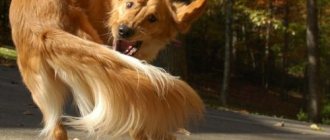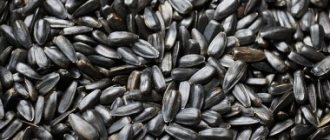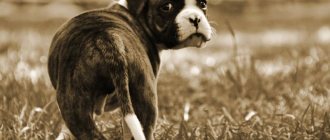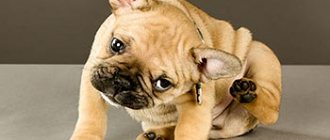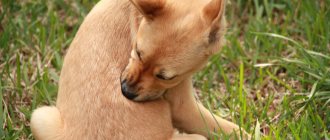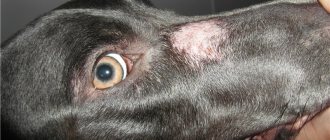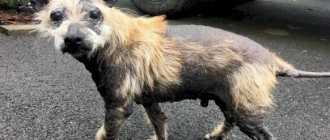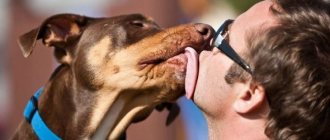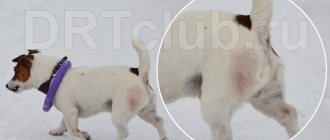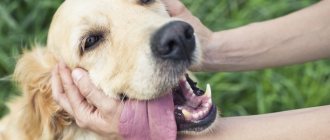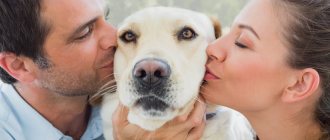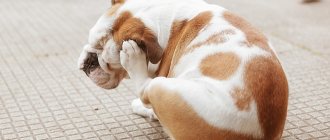When there is a pet in the house, it is a joy for the whole family. And every caring owner will be concerned about disturbances in the animal’s behavior and health problems.
I want to help as quickly as possible, but to do this you need to know the cause and methods of dealing with it . What to do if you notice that your pet has started gnawing on its back near its tail for a long time?
It happens when a pet begins to actively chew itself in the tail area. Often, as a result of this phenomenon, wounds and bald patches still form. Unfortunately, the dog cannot tell what is bothering him so much and the owners have to look for the reason. And this must be done as quickly as possible.
Causes
- First of all, you need to think about whether your dog has fleas . Most often, this is how the animal tries to escape from annoying pests. In such a situation, the pet itches for a long time and often.
- The second reason is allergy. It can be caused by:
- Inappropriate diet.
- New bedding. Allergies in a dog can be caused by poor-quality material of its resting place.
- Shampoo, but in this case it is more likely that the animal will chew out hair not only in the tail area, but also on other parts of the body.
Important! Dogs can only be bathed with special products for animals. The procedure cannot be performed often, maximum once a week or less.
- Another cause may be inflammation of the anal glands .
- It is also possible for hair to be chewed out due to subcutaneous parasites .
- It happens that the cause may be the stress of the pet.
Some dog breeds require trimming. Trimming - manually pulling out old hairs. And if the fur has already matured, but the animal still has not shed it, irritation may occur. Wire-haired dogs need trimming.
Hair comes out above the tail and on the sides
In principle, the reasons are the same as listed above. The main thing is to determine what exactly is bothering the animal.
For example, if the cause is the appearance of fleas, then this is easy to determine . You just need to carefully examine the surface of the skin and if there are parasites, then either they themselves or the laid eggs will be visible.
But what if the dog also chews out fur under its tail?
Under him
In such a situation, you need to seriously think about inflammation of the anal glands .
The paraanal glands are sacs located on the sides of the anus. In normal condition, the liquid in them is watery. If there are disturbances, it begins to become thicker, the sacs increase in size and the anal glands become blocked. In such a situation, the dog experiences pain.
Causes:
- Heredity. This problem most often occurs in small breed dogs. If you are overweight, this aggravates the situation.
- Poor nutrition. If the owners like to feed their pet from the table, then this may be the reason.
- Little physical activity. Animals need to move a lot, spend more time on walks and this will save you from such troubles.
- Decreased immunity.
Brief conclusion
Please note that when a dog itches and chews itself, you should not panic, you need to take specific measures. When you cannot independently determine the cause of this behavior, you should consult a doctor. Do not self-medicate under any circumstances, as this can make your pet feel worse. When the dog does not stop itching for a long period, there is no need to put off visiting the doctor, because sometimes the dog needs emergency help.
Currently reading:
- Thyroid dysfunction in dogs (hypothyroidism)
- Recommendations for obedience of a dog if it growls
- Recovery and nutrition of a dog after sterilization
- The first symptoms of a stroke and its treatment in a dog
Age, pregnancy or nursing
Some owners may not pay attention to this problem, explaining everything, for example, by the age of the animal. Or they dump everything on pregnancy or feeding puppies.
This problem cannot be related to the age of the animal. Pregnancy and feeding are also not reasons for gnawing.
Older dogs may experience hair loss. And lactating bitches may experience ritualism due to feeding puppies. But this has other manifestations . The degree of gnawing can be affected by the animal's temperament.
Diagnosis and treatment
To determine the cause of itching, you will need a whole range of measures:
- initial examination by a veterinarian: examination of skin lesions and identification of parasites;
- laboratory diagnostics: blood tests and waste products (feces, urine), skin scrapings, intradermal studies;
- if a systemic disease is suspected, ultrasound and x-rays are performed.
They begin to treat the animal by eliminating the root cause of the itching. If there are parasites, the pet is treated with antiparasitic agents in the form of drops and sprays. To eliminate allergies, antihistamines are prescribed, which help both neutralize the allergic reaction and relieve the accompanying itching in the dog. Injections and local therapy will help cope with skin diseases: it is recommended to smear the affected areas (eczema, lichen) and use medicinal vaccines (in particular, Vakderm).
For dermatoses, itching is relieved and the effects of scabies are eliminated with the help of disinfectants and antibacterial drugs. In severe cases, antibiotics can also help. Hyperfunction of the sebaceous glands requires clarification of the cause of the disorder and appropriate therapy. Sedative therapy and care will help you cope with the effects of stress.
Help your pet
Parasites
If the cause is fleas, then you need to take the following measures :
- Bathe using special shampoo.
Important! The shampoo should have a flea-killing effect.
- Treat with anti-flea drops.
- Wear a collar to prevent fleas.
If there are a lot of fleas, it is advisable to treat the home . You can use special aerosols. It is necessary to treat all surfaces in the house, carpets, and upholstered furniture as thoroughly as possible. It is also recommended to wash the floors and spray the threshold of the front door with the same product.
All this can be purchased at any pet store . If you do all of the above, then you will forget about such a problem as fleas for a long time.
Allergy
In the case where the cause is an allergy, you first need to find out what exactly it is. When suspicion falls on the dog's food, shampoo or new bedding, try changing the diet, bath or bed. If there is no improvement, then we look for another reason.
An allergy can be easily diagnosed if fur comes out after changing one of the above.
To eliminate symptoms, taking antihistamines is also necessary. The banal “Diazolin” , with the calculation of one tablet per 10 kilograms of weight.
In some cases, it may be necessary to take hormonal medications, but only a veterinarian can prescribe them correctly.
Inflammation of the glands
If the cause is inflammation of the paraanal glands, you need to clean them; you can do this yourself, but for the first time it is recommended to consult a specialist .
The resulting wounds at the site of gnawing can be treated with chlorhexidine.
Stress
In case of stress, the cause must be found and eliminated. Create favorable conditions for the dog's life.
If you have the opportunity to use the help of a veterinarian, it is better to contact a special hospital immediately after the problem appears . As mentioned above, you may need to take additional medications, and it is not recommended to prescribe them yourself.
How to help if a dog chews its fur?
When fleas are detected on an animal, they must be destroyed immediately. The problem is that by treating only the dog it is impossible to completely get rid of insects, since they are in the grass, in the floor and in the folds of the animal. Only if the dog has been completely treated can a flea collar be worn.
When the allergy factor is a new product introduced into the dog’s diet, such experiments should be abandoned and removed from the menu. Some manufacturers have special hypoallergenic dry food that you should switch to.
If objects or things, for example, a purchased rug, toy or feeding bowl, turned out to be a factor in the allergic manifestation, they should be removed. You also need to observe your pet for some time to be sure that the allergen has been eliminated.
For severe scabies, you will need hormonal medications prescribed by your veterinarian. In any case, the dog needs a proper diet. When inflammation of the anal glands has become a factor in chewing the fur, the cleaning should be performed by a veterinarian.
Why can a dog lick concrete?
If a dog tries to lick concrete, it is worth changing the usual vitamin and mineral supplements to those that contain an increased amount of calcium and phosphorus. After all, without phosphorus, calcium cannot be absorbed, even when it enters the body in sufficient quantities.
As an emergency measure, you can give the animal medications containing calcium lactate for 1-2 weeks. Hypocalcemia may increase during pregnancy, lactation, growth, recovery from injuries and fractures.
Lethargy and drowsiness can sometimes be accompanied by a deterioration in the health and quality of the coat, and peeling of the skin. Also, do not forget that for dogs this can be signs of a disease caused by iodine deficiency. Since this is quite dangerous, it is worth paying special attention to this. For treatment, it is advisable to consult with a specialist and take the prescribed dosages of preparations with seaweed.
Licking concrete is a sign of iodine deficiency in the body
Making an anamnesis
Of course, you can grab your pet and rush to the vet, but this is guaranteed to lead to one of two results:
Both options are incorrect, since treating something that is not there will not help, and healthy dogs do not suffer from seizures. If you notice that the dog is feverishly licking the floor, observe, or better yet, write down everything that happens. Too much, including the diagnosis, depends on the anamnesis. Based on the experience of owners and doctors, several similar scenarios of dog behavior can be identified.
The most common option is that the dog came from a walk, ate with appetite, drank water, and felt good. After 30–60 minutes, the pet begins to behave restlessly and slurp. The dog licks its nose and salivation increases. Anxiety grows and the four-legged animal begins to lick the floor, carpeting, window sills, etc. At the same time, the dog swallows everything that is on the floor (dust, small debris, wool).
The second option is that the dog begins to lick the floor and everything that catches its eye after eating. In practice, it has been noticed that the type of nutrition and the quality of feed (for the industrial type) are not particularly important. The attacks do not depend on the breed, since owners of both outbred and pedigree dogs contacted veterinarians. In most patients, diarrhea begins after a decrease in activity.
The third option is that the attack occurs on the street, the dog licks everything it sees from the ground, greedily swallows grass (fresh and dry), leaves, soil, and small stones. In fact, this option is the most dangerous, since it is difficult to stop the dog, and it can swallow anything.
The fourth option is that the dog licks the floor under stress, for example, after punishment, a loud sound, a rude command, etc. As in the first option, the dog hides, slurps, often licks its nose and breathes heavily.
The attack also ends in different ways, the most popular are two options:
With this development of events, the clear reason for the behavior is a severe attack of nausea and a nervous reaction in combination. Having even modest experience in keeping dogs, one can come to this conclusion logically. It is much more difficult to identify the causes.
Preventing itching in dogs
Prevention of itching in dogs by owners should be based on preventing the causes that cause itching. To reduce the likelihood of itching in dogs, dog owners should follow these recommendations:
- Provide balanced feeding for your pets; the diet should not be dominated by fatty foods or foods with a predominance of protein. (Basics of feeding dogs. Golden rules for rational feeding of dogs. Feeding puppies. Feeding aging dogs. Feeding pregnant females. Feeding lactating dogs).
- Carry out periodic treatments of the coat against ectoparasites, especially during walks outside the city and in nature.
- Regularly, especially after returning from a walk, inspect the skin for the presence of parasites (ticks, fleas).
- For dogs that are hypersensitive to allergic reactions, purchase hypoallergenic food for feeding.
- At least 2 times a year undergo preventive examinations at a veterinary clinic.
When to sound the alarm
Behavior when a dog licks the carpet in the house and gags can be classified as abnormal if there are other signs of illness.
The disease that caused vomiting can be determined by external examination. If an uncharacteristic odor appears from the mouth:
Typically, such dog health problems are chronic and should be treated by a veterinarian. He will perform the entire range of diagnostic measures, prescribe treatment and the right diet.
The cause of vomiting bile in a dog and obsessive licking of the carpet or floor may be other diseases:
Important! The dog is constantly infected with worms, so it is given antihelminthic drugs regularly.
Foreign bodies in the throat or digestive tract
If a puppy frantically licks the carpet, then vomits, and for a long time he cannot go “big”, then there is a high probability of intestinal obstruction. Usually such a misfortune happens to unlucky puppies who have swallowed a large bone or piece of a soft toy. In this case, you need to urgently go to the veterinarian, as surgery will be required.
Another symptom of intestinal obstruction is gradual bloating. At the same time, with a constant urge to vomit, no vomit is observed.
At the veterinarian's appointment:
Why do dogs sometimes lick the carpet, sofa and choke, what to do in this case
If your dog licks the carpet because something was spilled or dropped on it, there is nothing wrong with it. After all, dogs have a keen sense of smell and can sense a delicious aroma even several days after they dropped something on the carpet. In this case, such behavior will not bring anything terrible to the animal.
Sometimes the pet deliberately tries to induce vomiting in a row, this is accompanied by anxiety. Many dog breeders know why dogs chew grass in the summer, but in winter they are left to lick the carpet and upholstered furniture in the house. This is necessary to artificially irritate the vomiting center. In most cases, this is due to the presence of foreign objects in the gastrointestinal tract of animals.
Carpet is an excellent replacement for grass in winter
